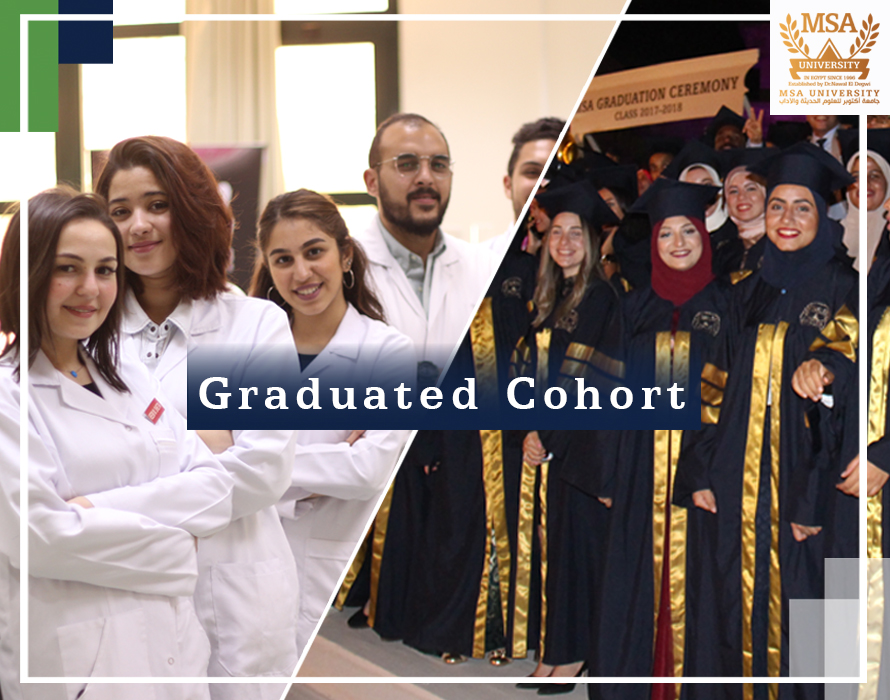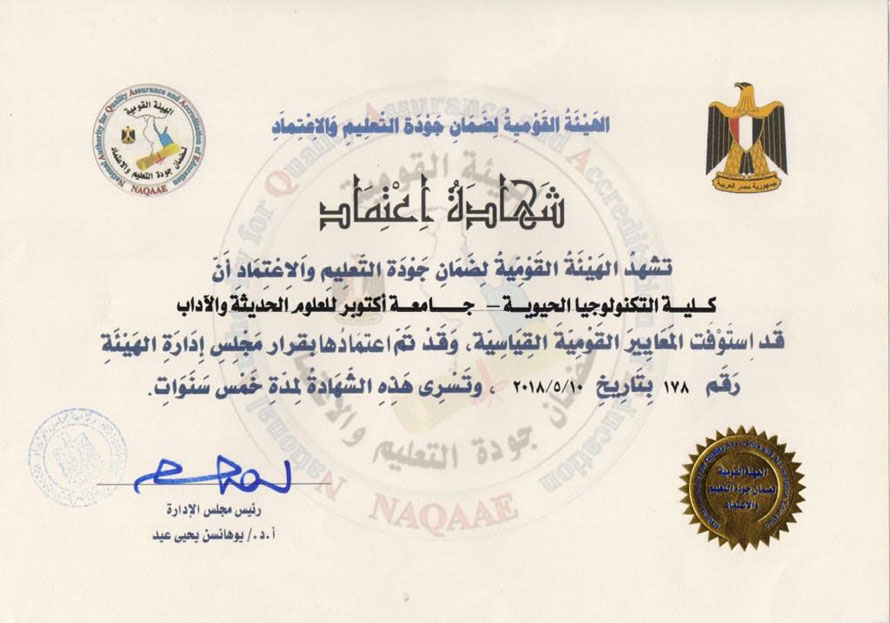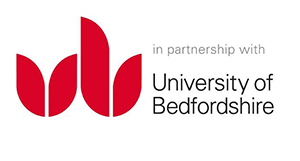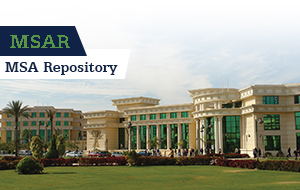Graduation Projects 2018-2019
If you cannot view the below document, please click here | Download the Graduation Project 2018/2019.
Program Intended learning outcomes (PILOs)
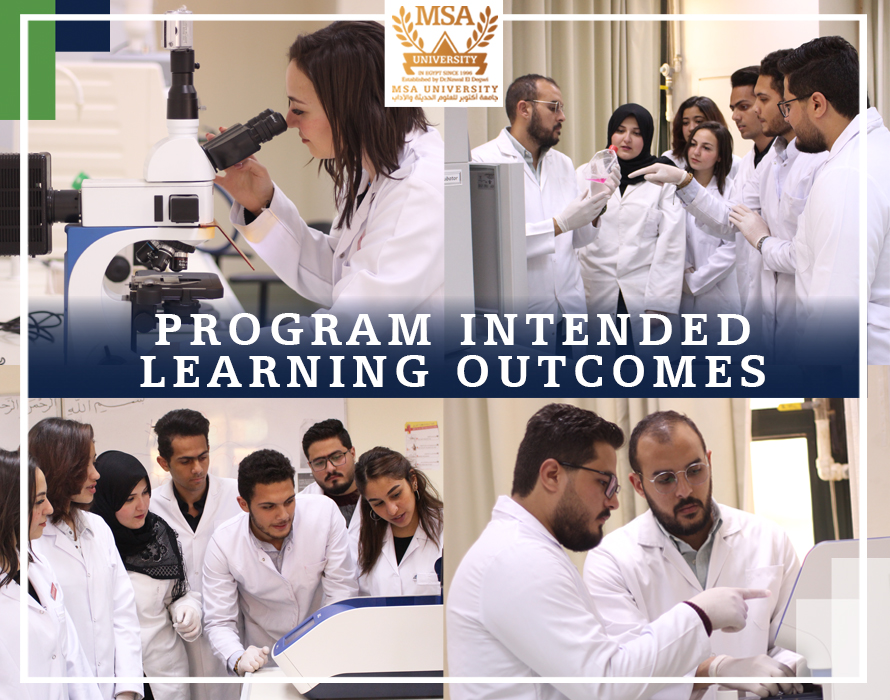
A. Knowledge and understanding of:
The graduates of Biotechnology programme should be able to demonstrate knowledge and understanding of:
- A.1. Core and associated sciences related to biotechnology.
- A.2. Fundamentals of biotechnological practices.
- A.3. Value of biotechnological applications on quality of life and the involved risks and biohazards.
- A.4. Lifelong and self-learning strategies for continuous improvement.
- A.5. Ethical, legal, and social issues associated with biotechnology.
- A.6. Strategies of digital learning and basics of programming.
- A.7. Global and cultural diversity issues in accordance with biotechnology.
- A.8. Basis of general and bio-statistics.
B. Intellectual skills (Cognitive Skills)
The graduates of Biotechnology programme should be able to:
- B.1. Assess and evaluate the impact of biotechnological applications on quality of life.
- B.2. Interpret data from different biotechnological disciplines and synthesize creative solutions.
- B.3. Evaluate biotechnological products, in field and/or laboratories, with reference to standards.
- B.4. Formulate hypotheses, and design scientific experiment in the field of biotechnology.
- B.5. Formulate goals and objectives, utilizing biotechnological information and data, for quality planning.
- B.6. Use innovative and creative problem-solving approaches in multi-disciplinary situational analysis.
C. Subject practical skills (Professional Skills)
The graduates of Biotechnology programme should be able to:
- C.1.Employ the theoretical knowledge and skills in practices in different biotechnological domains.
- C.2.Operate and maintain equipment with reference to standards.
- C.3.Perform biotechnological techniques safely in sterilized environment.
- C.4.Use molecular biology and genetic engineering procedures and techniques according to standards.
- C.5.Monitor, Retrieve, Categorize, analyse and evaluate relevant data from literature, using information technology, bioinformatics and library resources.
D. Transferable/key skills (Communication Skills)
The graduates of Biotechnology program should be able to:
- D.1. Communicate effectively using variety of media, with fluent discussion.
- D.2. Collaborate effectively within team and set priorities.
- D.3. Demonstrate effective time and resources management.
- D.4. Demonstrate skills for lifelong learning, self-learning and self-evaluation.
- D.5. Adopt a creative attitude in an ethical and scientific approach.
- D.6. Use software and digital data-basis effectively.
Program Educational Aims (objectives)
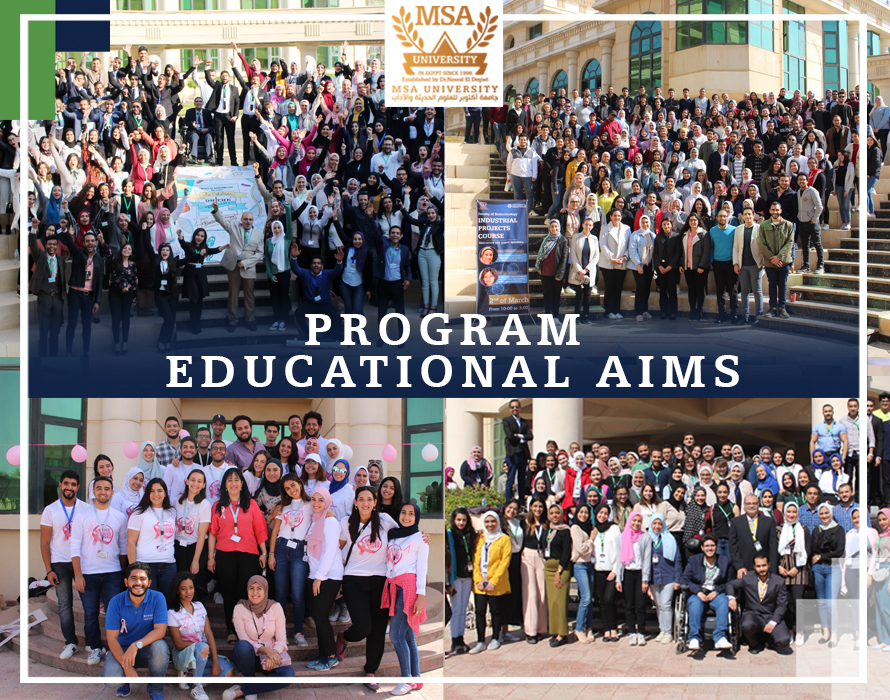
The Bachelor program in Biotechnology aims to:
1:The Bachelor program in Biotechnology aims to: Provide a coherent, extensive, multidisciplinary study to have graduates prepared with the ideal foundation in the scientific community, through high quality teaching, scholarship and research, as well as the necessary skills and abilities to invade the challenging Biotechnological industries, and a strong will and motivation directed towards a pivotal role in the improvement of the quality of life.
2:Prepare bright young scientists for a challenging career in medical, pharmaceutical, agricultural, industrial and environmental biotechnology. The career opportunities for biotechnology students are very promising in research, production, development and manufacturing such as genetic counselling, clinical molecular diagnostic laboratories pharmaceutical industry, biotech industry, crops genetics and tissue culture, food industry, forensic sciences, bioinformatics, environmental agencies, and academic careers.
Graduated Cohort
Book Club 2015
Reading is the first of all talents that we learn as children, but then to evolve in life, we have to understand what we are reading and what it is relating to and because learning should be fun, faculty of biotechnology has initiated its very unique club (The BOOK CLUB).
Faculty members information
If you cannot view the below document, please click here | Download The Faculty members information.
Differential Glut1 Expression in Hepatocellular Carcinoma And Peri - Malignant Chronic Virus C Hepatitis
Aboushousha, T., Hirzi, H., Ageez, A., & Helal, N. (2017). Differential Glut1 Expression in Hepatocellular Carcinoma And Peri - Malignant Chronic Virus C Hepatitis. International Journal of Recent Scientific Research, 7(12), 14743-14750.
Validated by:
Who's Online
We have 1052 guests and no members online
MSA University Campus Map
Main Office - 6th Oct. Campus
26 July Mehwar Road intersection with Wahat Road, 6th October City. Egypt.
Tel. : 3837-1113
Tel. : 3837-1115
Tel. : 3837-1516
Tel. : 3837-1519
Admission Office: admission@msa.edu.eg
Graduates Affairs: sgaffairs@msa.edu.eg
Mobile: 01270447292
Hotline : 16672
International Hotline: 002-0216672

